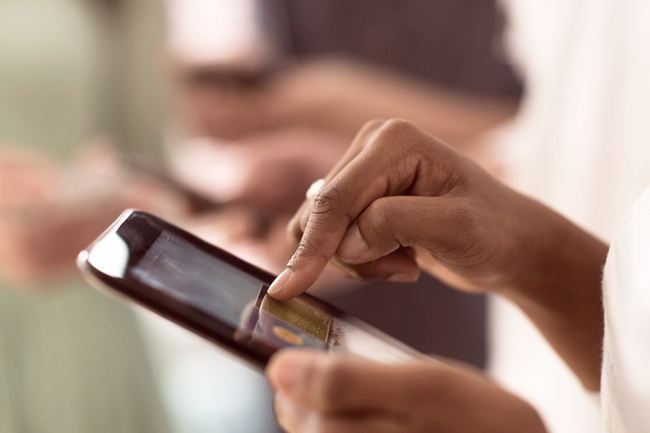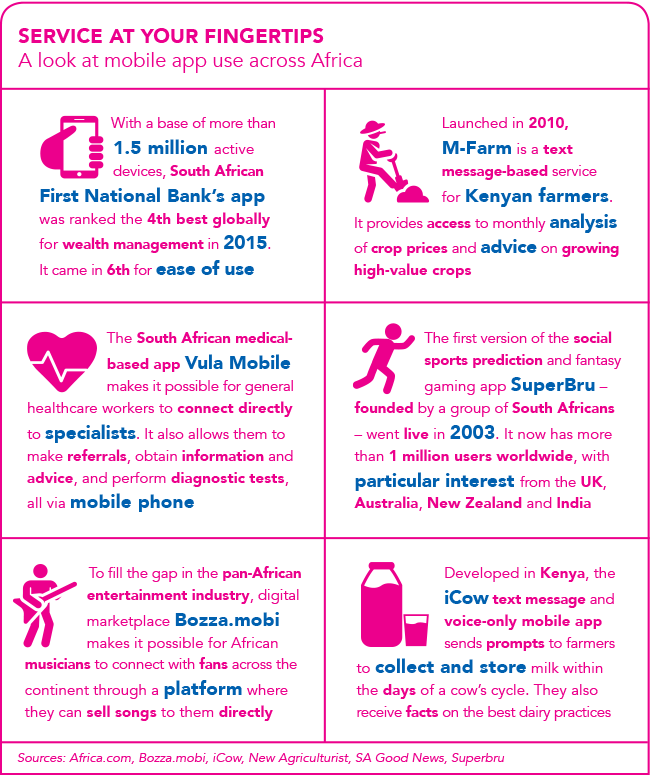Mobile-first Africa is expanding at incredible speeds. Now that almost 400 million people on the continent own a mobile phone, the market for home-grown apps is booming.
One such example is the Vula Mobile – developed in South Africa – which connects health workers in remote parts of the country with specialists in hospitals. Using the hub, health workers can perform a basic eye test and capture a medical history, which is then sent directly to the specialist. The app has proven so successful in the original field of ophthalmology, that it has now expanded its services to cover orthopaedics, dermatology, cardiology, ENT, HIV, family medicine and burns.
Founder William Mapham was inspired by the idea that African healthcare systems were not lacking ‘generals’, but rather ‘foot soldiers’ (rural health workers) at the front line. ‘Vula is a powerful system built by the foot soldiers that can help the generals improve our healthcare system, saving time and costs for patients, health workers and the health system – and all the while offering remote case-by-case training,’ says Mapham.
Rural patients needing specialist medical care often have to make a long trip to the city, even if it turns out they have a simple condition that could have been treated at home. In cases where there is a serious condition, it is often not referred quickly enough. Vula solves these problems and has helped more than 3 600 patients since its launch.
‘We consistently see an average of 25% of cases only needing advice from specialists. Imagine the cost and time savings for the system and for patients, if a quarter of all referrals to tertiary hospitals could instead be treated at primary level,’ he says.
Another app active in the healthcare space is Kenya’s Flare, which is an Uber-style app for ambulances. The app aggregates available ambulances onto a single system, allowing patients and hospitals to see available options and request help quickly. Co-founder Caitlin Dolkart says that in a city like Nairobi, which lacks a 911-style centralised emergency response dispatch system, critical time is wasted as people locate ambulances. ‘Mortality is unbelievably high in emergency cases. Data has shown that every minute saved can increase the chance of survival by 8%,’ says Dolkart.
That’s where Flare comes in. And it’s not just in health that apps are taking off in Africa. The likes of Ghana’s photo app Suba and Kenya’s music app Mdundo are active in the entertainment spaces, while there is also scope for mobile apps in areas such as education and agriculture.
Ethiopian development house AhadooTec taps into all these areas. The start-up company has developed a learning platform and app for students, as well as a web and mobile app for agricultural extension workers. Lately, it has seen government take an interest.
‘One of our major projects is developing governmental mobile apps on Android and iOS for 20 government offices, as well as a national app store for Ethiopia. The apps include tourism, taxation, health and education apps,’ says Amanuel Abrha, co-founder of AhadooTec.
According to On Device Research – which conducted a survey of mobile internet users in South Africa, Kenya and Nigeria – 63% of Africans say mobile internet has greatly improved their lives, compared to 40% of people in the UK. This is due to greater access to education, entertainment and so on.
Yet the research also shows that app usage is not yet having the desired impact in areas such as learning and health. 67% of respondents used mobile internet to download and listen to music, while 54% used it for social media. Health and learning, meanwhile, were at the other end of the spectrum.
‘Apps or services that provide connectivity are still mostly used to access entertainment content like music and to connect with family and friends,’ says Derrick Kotze, CEO of the mLab Southern Africa innovation hub in Johannesburg.
‘There is still a long way to go for the market to widely adopt apps for services. I do believe that part of the low adoption has to do with the limited amount of really useful, relevant and hyper local services available through apps and that once there are more apps developed and published the usage will increase,’ he says.
Dolkart believes the limited usage of apps is in part due to the cost of data – with most people still buying pay-as-you-go bundles – and the memory size of phones. ‘We’ve heard consistently that it’s common to download an app, delete it when you run out of space and then re-download it,’ she says.
Encouraging the development of relevant apps and boosting uptake of more socially-beneficial services requires a supportive ecosystem, and this is something that is beginning to develop. Google has set up innovation hubs on the continent for the development of African apps, while other longer-established hubs are increasingly focusing on the space.
According to Abrha, such hubs allow developers to meet like-minded people, as well as investors. ‘Furthermore, some of them may provide training and business advice. It can also be infrastructure like co-working spaces and reliable and fast internet, which is essential for app development,’ he says.
Funding for app developers is also an issue, one that Kotze at mLab Southern Africa is trying to address. Earlier this year, the hub partnered with South Africa’s Technology Innovation Agency to launch a fund for mobile apps, addressing the need for more early-stage funding. ‘The investment is intended to remove some very basic obstacles often faced during the early stages of tech start-ups, be it the first prototyping stage, or first pilot, or market entry,’ says Kotze.
‘Our goal is to prove that these smaller and very targeted investments are key to stimulating a larger pool of innovations that can be pivoted and validated as early and as quickly as possible.
‘We hope this fund will grow and gain an important place in the investment value chain, and also bring a better understanding of the true investment amounts required for building a viable application-based business,’ he says.
For all the excitement about smartphone uptake among Africans over the last few years, feature phones have remained the norm. That is gradually changing, according to the International Data Corporation, which says sales of smartphone and feature phones are now almost on par. Yet the continuing dominance of feature phones means there is still a huge industry in developing apps appropriate for them, especially when these apps are targeting more rural, low-income segments.
‘Feature phones still dominate the African market and are likely to stay there for a while. That means there is still a sizeable market to address with feature phones for the next – probably – five years,’ say Abrha.
As time passes, however, we approach the age of the smartphone. More forward-thinking companies are preparing to ride this wave while also ensuring they keep those with feature phones connected.
‘Feature phones will continue to gradually transition out of the market with the increasing number of affordable smartphone options. However, the transition from buying a smartphone to downloading apps, may take longer,’ says Dolkart.
‘Therefore, we are thinking about hybrid approaches – how do you interact with your smartphone more similar to a feature phone to brace the transition? If our users have smartphones but are unlikely to download the app, how do we become a demanded service? That’s one big question we’re addressing head on. We must be relevant, simple to use and access, and something that people want,’ she says.
Dolkart is clear that there is huge potential for apps in Africa given the information asymmetry in the market across industries, especially in health and education. ‘For any industry where there are large disconnects between the supplier and the buyer or the service provider and the consumer, apps can massively help bridge the gap. We believe that there is a tremendous opportunity to empower the end user to make more informed decisions while also contributing to the improvement of the system,’ she says.
However, ensuring apps are relevant for African users is key. ‘The interesting question will be if the majority of developers will focus on apps that solve real problems,’ says Abrha. ‘In the majority of the countries in Africa, there is still a lack of localised and qualitative apps.’






